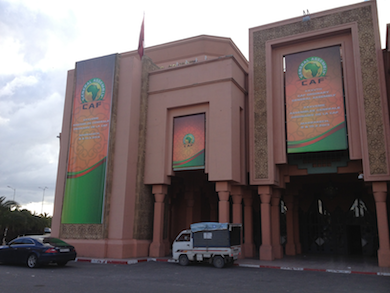By Osasu Obayiuwana, at the CAF congress in Marrakech, Morocco
March 9 – Backslaps, embraces and hearty chat are always on offer, when the great, the good and the miscreants in African football politics congregate, at least in public.
But as Danny Jordaan, the vice president of the South African Football Association (SAFA), poignantly observed – and has learnt, to his great cost – is that what is done in the smoky backrooms, beyond public view, is another kettle of fish.
“Things change over night in African football politics,” says the former 2010 World Cup CEO, who is seeking a place on the CAF executive committee.
“People can say that they support you, that they’re behind you… But you can never be sure of what they’ll do on Election Day.”
As his resounding loss at the 2011 CAF Congress in Khartoum, Sudan, bears out, organising an excellent World Cup, or even having articulate, well-thought views on the way in which African football should develop, does not make one, even him, an automatic shoe-in for a seat at the top table in continental football.
The most interesting currency, in exchange for votes at previous CAF congresses, is the offer of power, influence and dependable alliances in a very fluid, torrid, political world, where its often insecure members seek, primarily, the protection and maintenance of personal interests and, sometimes, when a charitable, broad-minded mood permits, national and regional ones.
At the CAF congresses I have witnessed, rarely has there been heated, reasoned debate about the state of the African game or what is needed to make it effectively compete at the global level, where it is clear that the continent, with its incredible depth of talent, is betraying its gifts.
The 2011 congress in Sudan, the last elective one, was an eloquent testimony to that.
With five out of Africa’s six teams, at the 2010 World Cup finals, eliminated in the first round, just months before, it would have been logical for football chieftains to examine what was responsible for the continent’s dismal performance and proffer solutions.
But not a single word was said about that. Most of the time was spent eulogising the “sterling achievements” of CAF president Issa Hayatou, who is set to extend his 25-year reign on Sunday.
“No one wants to discuss the real issues of African football in public,” says an East African official.
“People are currying favour, from the powers that be in CAF, in order to get appointments on to committees and enjoy all the benefits. You don’t get those things by being a critic,” he said.
“Truth-tellers are not highly favoured in Africa. If you want to advance, it is better to keep what you really think to yourself,” said another official, from West Africa.
That one cannot name the two highly-placed officials, who made these statements, is indicative of the level of fear within the African game, with people not wanting to publicly walk where angels fear to tread. Self-preservation, that first law of nature, is strongly at play within this undulating terrain.
In a very long, informal chat I had with a member of the CAF executive committee in Johannesburg, the day after Nigeria beat Mali in the Africa Cup of Nations semi-finals, he admitted that the prevailing mind set at the top table needs to radically change.
“We, as African football leaders, need to examine some of the negative things that people are saying about us, to see whether what is being said is true.”
“If some of what is said is true, that we are not doing things correctly, then the issue should not be about who has said it and making enemies out of them. It is about what we must do to change things.”
“Football in other parts of the world is advancing and we are at risk at being left behind. We need the best people in Africa, the best technical people, the best marketing people and financial people, to move our game forward. Otherwise, we will be the losers.”
“There is a [conservative] mind set, used to doing things in a particular way. They are not easy to accept change. That I have noticed.”
And unless the constitution of the current CAF executive committee has a larger number of ‘progressives’, the status quo is likely to remain.
Feeling outnumbered and outgunned by the old guard, those seeking meaningful change have kept their crusading swords in their sheaths.
But should people with the mind-set of Augustin Senghor, president of FSF, Senegal’s Football Federation, join the top table, meaningful reform of the way business is done in the African game may not be a mirage after all.

